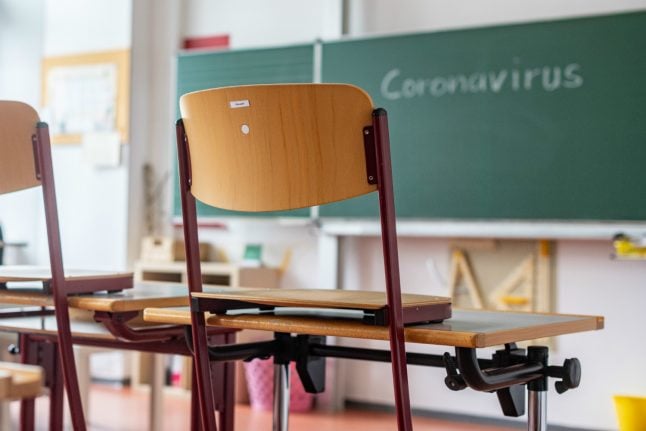The nation's Academy of Sciences Leopoldina recommended Monday a gradual relaxing of restrictions in stages if new infections stabilise at a low level and personal hygiene measures to avoid spread of the coronavirus are maintained.
The Academy's findings are to form the basis for a decision Wednesday by German Chancellor Angela Merkel and the heads of Germany's 16 regions about whether to extend restrictions imposed in mid-March that are set to expire on Sunday.
As of Monday April 13th, there were more than 127,800 confirmed coronavirus cases in Germany, according to Johns Hopkins University figures.
Of the total, around 60,260 people have reported themselves to have fully recovered from the virus. With around 3,000 deaths from Covid-19, the disease caused by the new coronavirus, Germany is far behind other big European nations with much larger death tolls.
Over the weekend, Germany's Health Minister Jens Spahn had already cued up a phased easing of restrictions that may vary by region.
He did not specify which sectors in Europe's largest economy could first see loosened restrictions.
READ ALSO: Germany could see 'gradual return to normality' after Easter holidays
How should Germany come out of lockdown?
The Academy of Sciences Leopoldina report stated that “criteria and strategies for a gradual return to normality” should be developed.
The prerequisites for relaxation are that the number of new infections remain at a low level, that the health care system is not overloaded and that regular patient care is possible.
The experts recommended reopening schools as soon as possible, starting with primary and middle schools.
They said most child care facilities, such as Kitas, should initially only open to a very limited extent because smaller children would likely not be able to follow hygiene and distance rules well.
Distance learning should be used in secondary schools initially.
The researchers also recommend the mandatory use of face masks in future. “The wearing of mouth and nose protection should become mandatory as an additional measure in certain areas such as public transport,” said experts.
If infection rates remain low and the health system is not overburdened, retail and catering outlets could also be opened gradually. Travel could then also be permitted again – with strict regulations.
Researchers said the government must find ways to ensure people adhere to protective measures, like social distancing rules and increased hygiene.
READ ALSO: When and how will Germany's lockdown measures end?
 People walking in the rain in Frankfurt on Monday. Photo: DPA
People walking in the rain in Frankfurt on Monday. Photo: DPA
Mobile phone tracking
According to the research team, Germany should also advocate using mobile phone data on a voluntary basis in order to gain a better overview of the epidemic.
The scientists consider it indispensable to “substantially improve the collection of data on the infection and immunity status of the population”.
However, any hope for a quick end to all restrictions was dashed by the scientific committee: the pandemic would dominate economic and social life “for months to come”, they said.
INTERVIEW: How Germany is gearing up for virus-tracing app
More testing and climate protection
The Leopoldina report also calls for significantly more testing. So far, tests are being conducted mainly on people who have shown symptoms. This is not enough, because many people with coronavirus have no symptoms – and yet could possibly infect others, say researchers.
Therefore, studies are needed to determine the percentage of infected people in a representative sample.
The scientists also warned against neglecting climate protection in the corona crisis. “The development of a climate-friendly economy” should continue to be the goal of politics.
Economic stimulus packages should therefore be linked to sustainability goals.
Ensure acceptance by the population
The scientists also said it was of huge importance for the public to accept all measures in place.
Researchers said restrictions always had to be temporary – and that the decision-making processes were made transparent.
The authorities should also not lean too heavily on punishments for those who flout rules, and should instead focus on appeals for personal responsibility.
“In principle, standards are most likely to be followed if they are clear, unambiguous and comprehensible,” says the Leopoldina report.
READ ALSO: 'The situation is fragile': Merkel urges Germans urged to stick to coronavirus restrictions
The researchers said politicians should now draw up a timetable for these measures.
In addition, extra help was needed for those people who were particularly vulnerable in the crisis. These include elderly people living alone, refugees, migrants without German language skills and homeless people.
The academy includes social scientists as well as medical researchers among its team of experts.
The head of the Academy, Gerald Haug, said these measures could only go forward accompanied by an obligation to wear a face mask while riding in public transport to prevent a resurgence of infections.
“Every citizen should in the future have this type of protection for their mouth and nose and wear it each time social distancing measures can't be respected,” he told the weekly Der Spiegel.
With reporting by Yannick Pasquet



 Please whitelist us to continue reading.
Please whitelist us to continue reading.
Member comments